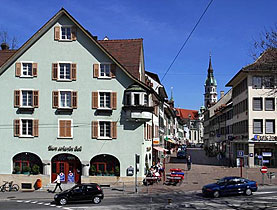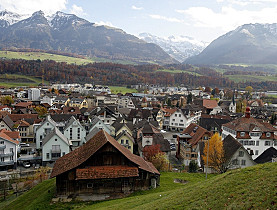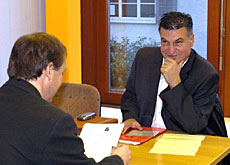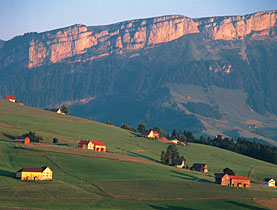Rich and poor taxed alike as cantons compete

More cantons are likely to adopt a flat rate tax model as competition to attract higher revenues heats up in Switzerland and abroad, specialists have forecast.
Obwalden became the first canton to introduce a single income tax rate for all inhabitants regardless of wealth at the start of the year. Canton Uri has voted to follow suit and Thurgau may soon join them.
The radical change is the latest development in a race by smaller cantons to transform their economic fortunes by enticing newcomers – preferably wealthy people – to relocate and fill the local tax coffers.
Cantons such as Zug and Schwyz have successfully rejuvenated their economies with a range of tax breaks for individuals and companies, some of them controversial.
Eastern European countries have also stolen a march on Switzerland in recent years by introducing flat rate income tax models, and thereby becoming a more attractive workplace.
An international study by tax specialists KPMG revealed that many countries around the world have intensified competition by slashing income tax in the last five years. The top rate had fallen 2.5 per cent on average in the 87 countries that were surveyed.
Jörg Walker, KPMG head of tax, suggested that other Swiss cantons could copy Obwalden or countries such as Macedonia and Bulgaria by taxing all income levels at the same rate. But he warned that the system would result in reduced tax revenues that would have to be made up somehow.
Fair deal?
“Some other smaller cantons have the capacity to make this change, but it is harder for bigger cantons because they would lose too much income,” he told swissinfo. “It was good for Obwalden because they only lost SFr10 million [$8.4 million] which they could easily make up by attracting more inhabitants.”
Thurgau has estimated that it would lose SFr100 million in revenues if it adopts the flat rate, but it will recommend that citizens vote for the change next September because it is confident that it can attract enough wealthy people to make up the shortfall.
“We have two motives: to ease the burden for existing taxpayers and to get more revenue. We believe this tax system will attract more people into the canton,” the head of Thurgau’s government, Bernhard Koch, told swissinfo.
But not everyone agrees with a system that treats rich and poor alike. The centre-left Social Democrats have long argued that the cantonal competition to lower tax rates could lead to a disastrous “race to the bottom”.
Return to Middle Ages
Communist parliamentarian Josef Zysiadis, who successfully overturned Obwalden’s degressive tax model (lower rates for higher earners) in the federal court, has been an even fiercer critic.
“The flat tax… would be the end of social solidarity. In a way, it’s the return to the Middle Ages in the social organisation of society. The richer you are, the less you contribute to the community,” he told swissinfo in 2006.
Walker believes the most important element to changing the system of tax is the fight for hearts and minds.
“You have to convince people that the changes will still result in a fair system. Switzerland has a history of the progressive tax rate system so people have in their minds that this is fair,” he said. “Wealthier people may pay the same rate with a flat tax model, but they still end up contributing more money.”
swissinfo, Matthew Allen in Zurich
KPMG compared the top rate of income tax in 87 countries. It ranked European countries together with Swiss cantons/cities (federal, cantonal, communal rate combined). Here are selected rankings:
1: Macedonia/Bulgaria 10%
2: Russia 13%
3: Serbia 15%, Ukraine 15%, Czech Republic 15%
4: Romania 16%
5: Isle of Man 18%
9: Canton Zug 23.1%
10: Canton Schwyz 23.9%
12: Canton Obwalden 24.1%
35: Zurich city 39.95%
36: Greece, France, Poland, Britain 40%
43: Spain, Italy 43%
45: Geneva 44.97%
46: Germany, Croatia 45%
51: Denmark 59% (top income rate in Europe)
The average top income tax rate among Swiss cantons was 33.5%
The introduction of flat rate income tax in some cantons is unlikely to stir international ripples, but other aspects of Switzerland’s tax model have raised the hackles of various countries.
Three years ago the European Commission launched an offensive against the Swiss corporate tax system. The EC claimed the practice of offering breaks to foreign holding companies was anti-competitive. The issue has not yet been resolved.
Various Swiss cantons offer tailor-made tax perks to wealthy individuals, luring rich people and their tax revenues away from their home countries. This became a theme of the French Presidential elections in 2006 when rock star Johnny Hallyday announced his intention to move to Switzerland.
Switzerland has long been regarded as a haven for tax evaders from other countries thanks to its banking secrecy laws. Swiss bank UBS was this year implicated in an ongoing investigation in the United States.
Germany and France last month called on the OECD to blacklist Switzerland as an uncooperative tax haven.

In compliance with the JTI standards
More: SWI swissinfo.ch certified by the Journalism Trust Initiative




You can find an overview of ongoing debates with our journalists here. Please join us!
If you want to start a conversation about a topic raised in this article or want to report factual errors, email us at english@swissinfo.ch.